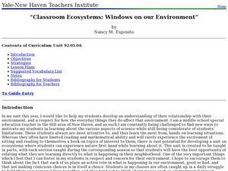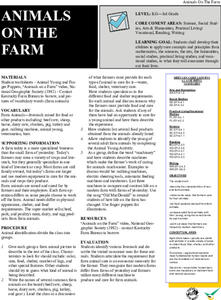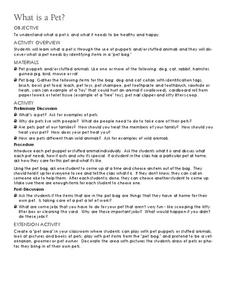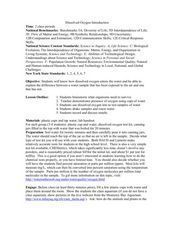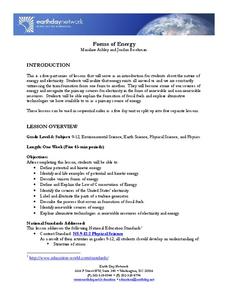NASA
Stellar Fingerprints and Doppler Red Shifts
Young scientists observe the spectra of elements and compare that to the Doppler effect. Hook scholars from the beginning all the way to the extension activities in this 5E-format lesson.
Kenan Fellows
Sustainability: Learning for a Lifetime – Soil
Do great gardeners really have green thumbs—or just really great soil? Environmental scholars discover what makes Earth's soil and soil quality so important through research and experimentation. Learners also develop an understanding of...
Alabama Learning Exchange
The Four Seasons
Students who are special needs and early elementary students study facts about the four seasons. They listen to read aloud books about each season before completing associated graphic organizers. They illustrate pocket books to hold all...
Curated OER
Classroom Ecosystems: Windows on our Environment
Young scholars in a special education classroom examine their relationship with the environment. As a class, they examine the concept of a web of life and create their own classroom ecosystem. In groups, they record their observations...
Curated OER
Is a Pulley a Special Kind of Lever?
Fifth graders use information from their text to read and discuss pulleys and levers. They examine a top sketch of the arrangement of a fixed pulley. Working in groups, 5th graders perform experiments to test the effect of using a pulley...
Curated OER
Science: Observing Fish Behavior
Students identify and explain various fish behaviors through observation. Over several months, they watch one fish in the classroom aquarium and record its behaviors in notebooks. They visit a virtual aquarium Website to find...
Curated OER
Human Body Series - Respiratory System
Elementary schoolers play a respiratory relay toss in order to take in the respiratory system! They also create their own question cards based on several kid-friendly online articles about breathing and the health of the lungs. They use...
University of California
Energy and Biomass Pyramids
Young scientists play tag as they act out the food pyramid in the ocean ecosystem. Energy circles pass from the smaller prey to the predators and at the end of the activity, a data chart and analysis questions allow pupils to apply their...
Science Matters
Blubber Gloves: It’s All About Insulation
Instill the concept of adaptation with the help of Blubber Gloves—ziplock bags, shortening, and duct tape. Scholars discuss how animals and plants keep warm in polar regions, record their predictions, and try on their Blubber Gloves to...
Montana State University
Everest Extremes: Biodiversity
How many animals can live in a climate as cold as Mount Everest's? Find out with a science lesson all about biodiversity. Activities include research, presentations, group work, coloring maps, and a simulation of a food web.
Curated OER
Animals on the Farm
Students work in groups to create a description of a farm animal. Other classmates try to guess the animal. The class discusses what farmers need to provide for each animal on their farm (food, shelter, veterinary care). Students...
Curated OER
Classification and Adaptations- Streams, Rivers, and Lakes - Where the Land Meets the Sea And Caribbean Reef
In this science worksheet set, students answer 14 short answer questions about the classification and adaptation of life in streams, rivers, and lakes. They also answer 15 questions about life "Where the Land Meets the Sea" and in a...
Curated OER
What is a Pet?
Students define what a pet is and what it needs to be healthy and happy. They explore pets through the use of of puppets and/or stuffed animals and discover what a pet needs by identifying items in a "pet bag."
Curated OER
Laboratory Safety Rules
A one-page contract commits your science pupils to safety in the laboratory. Included in these nine rules is a list to fill in locating emergency equipment and important phone numbers. Every laboratory class should begin with a...
Oregon Museum of Science and Industry (OMSI)
DNA Extraction
What does your DNA actually look like? Use simple materials with this experiment to find out! Geneticists of all ages can follow these instructions to extract their own DNA. For learners who are hoping to extend the activity, there are...
Curated OER
Dissolved Oxygen Introduction
Students are shown how dissolved oxygen enters the water. They are taught the difference between a water sample that has been exposed to the air and one that has not. Students brainstorm what organisms need to survive. They use dissolved...
PBS
The Caterpillar or Larva
The larval stage of the butterfly life cycle is quite exciting. Start a discussion about the specially designed body parts unique to caterpillars. After examining images of caterpillars, learners use plastic soda bottles, string, and...
Curated OER
Insects A-Z!
Alphabet insects! Who has ever heard of such a thing? Get ready because your class is going to research insects that start with a specific letter of the alphabet. In small groups, they'll use the Internet and reference texts to locate...
American Chemical Society
Investigating the Line
Note that this lesson plan is best paired with the preceding lesson plan in the unit. In that lesson plan, elementary physical scientists observed that the color coating of M&Ms® candies do not mix when dissolved off of the chocolate...
Serendip
Cell Differentiation and Epigenetics
Pregnant women exposed to PAH air pollution increase the risk of obesity in their children. The example of epigenetics, along with others, builds the basis for understanding the process of cell differentiation. Scholars view a video,...
Curated OER
Special Sunflowers
Students view a picture of Van Gogh's Sunflowers. In this caring and kindness instructional activity students read Camille and the Sunflower and explore the feelings of the characters. Students complete worksheets related to Camille's...
Earth Day Network
Forms of Energy
Give me a home where electric buffalo roam and I'll show you an ohm on the range. Introduction your classes to potential and kinetic energy, electricity, and renewable resources with a resource that combines observation, direct...
Polar Trec
Ozone Data Comparison over the South Pole
Did you know the hole in the ozone is seasonal and filled by January every year? The lesson uses scientific measurements of the ozone over the South Pole to understand patterns. Scholars learn that the hole grew bigger annually before...
Curated OER
Rocket Science
Young scholars examine what it takes to be a rocket scientist and other related careers. In this rockets instructional activity students use the Internet to do their research.





